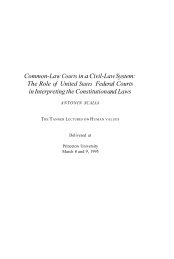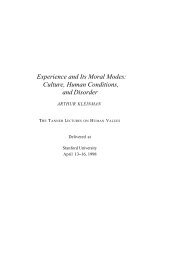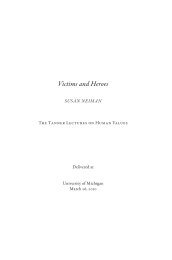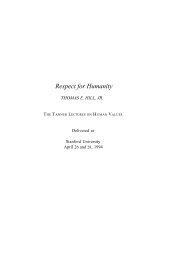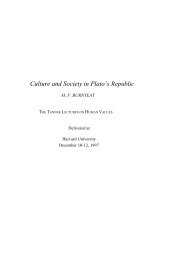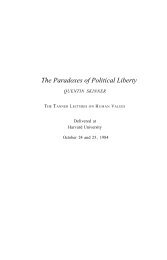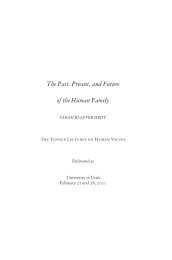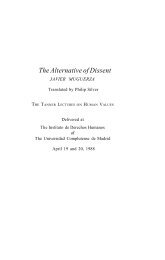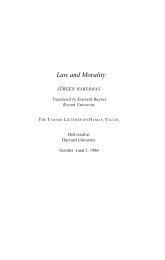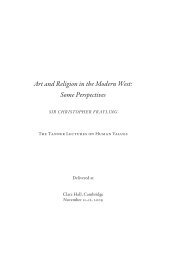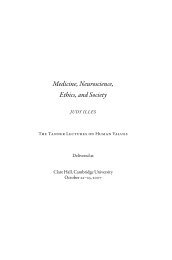Slote, Michael - The Tanner Lectures on Human Values
Slote, Michael - The Tanner Lectures on Human Values
Slote, Michael - The Tanner Lectures on Human Values
You also want an ePaper? Increase the reach of your titles
YUMPU automatically turns print PDFs into web optimized ePapers that Google loves.
96 <str<strong>on</strong>g>The</str<strong>on</strong>g> <str<strong>on</strong>g>Tanner</str<strong>on</strong>g> <str<strong>on</strong>g>Lectures</str<strong>on</strong>g> <strong>on</strong> <strong>Human</strong> <strong>Values</strong><br />
sively sacrifices everything to the advancement of his daughters.<br />
And so we have yet another interesting parallel between altruism<br />
and satisficing moderati<strong>on</strong>.<br />
To complete our discussi<strong>on</strong> of the virtue of moderati<strong>on</strong>, we<br />
must .say something, finally, about how satisficing moderati<strong>on</strong> as<br />
described here relates to the Aristotelian virtue of moderati<strong>on</strong> or<br />
temperance. Aristotle actually uses two terms that can be translated<br />
as “moderate.” One of them, sõphrõn, designates <strong>on</strong>e of<br />
Aristotle’s main moral virtues and represents a habit of “medial”<br />
choice and desire with respect to bodily pleasures. <str<strong>on</strong>g>The</str<strong>on</strong>g> temperate<br />
or moderate individual, in this sense, desires and chooses the right<br />
or reas<strong>on</strong>able amount of food or sex in the various changing circumstances<br />
of his life, where this right amount lies in a mean<br />
between extremes. This c<strong>on</strong>cept of moderati<strong>on</strong> is part of Aristotle’s<br />
general theory of the virtues, but in canvassing received<br />
opini<strong>on</strong> and comm<strong>on</strong>-sense ethical views, Aristotle sometimes uses<br />
another term, metrios, which also can be translated as “moderate.”<br />
In his discussi<strong>on</strong> of justice, for example, he points out that those<br />
who take less than they deserve and give others more than they<br />
strictly deserve are sometimes praised for their moderati<strong>on</strong> or<br />
modesty (Nicomachean Ethics, 1136b 15-24). Here, and in a few<br />
other places in the Nicornachean Ethics, Aristotle uses the term<br />
metrios; the more frequent term for moderati<strong>on</strong> (or temperance)<br />
is sõphrõn, and the latter c<strong>on</strong>veys Aristotle’s theoretical view<br />
about the virtues. Metrios, by c<strong>on</strong>trast, is used to express an ordinary<br />
Greek idea of moderati<strong>on</strong>, and as such I believe it comes very<br />
close to the c<strong>on</strong>cept of moderati<strong>on</strong> delineated in these lectures.<br />
It is easy enough to c<strong>on</strong>fuse, or be c<strong>on</strong>fused about the relati<strong>on</strong><br />
between, these two noti<strong>on</strong>s, not <strong>on</strong>ly because in English <strong>on</strong>e<br />
and the same term can be used to c<strong>on</strong>vey either of them, but also<br />
because there is at least some comm<strong>on</strong> c<strong>on</strong>ceptual basis for the<br />
identical translati<strong>on</strong>. Both noti<strong>on</strong>s str<strong>on</strong>gly c<strong>on</strong>vey the idea of a<br />
mean between extremes. But the noti<strong>on</strong>s diverge in other respects,<br />
and by pointing out how, we shall be in a positi<strong>on</strong> to see that the



